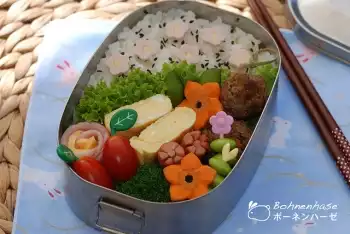
As daily news of violence unfolds, the question of what we’re doing and what we leave behind seems to loom ever larger. I’m hungry for order, logic, beauty, looking for understanding. Poet Mary Ruefle writes, “Someone reading a book is a sign of order in the world.” Exploring other voices and wanting to stay based in reality, my own reading choices have veered to non-fiction. My reading lunchbox this summer has a mixed bag of author goodies selected, arranged and presented like a book bento.
First, consider the Japanese bento lunchbox: a partitioned, compact container holding carefully and artistically arranged food, exemplary of the Japanese concept of mingei, the marriage of form and function. Built around creative and aesthetic sustenance weighed with nutritional balance, bento is surprising and unique, prepared with love. Book bento, anyone?
Book Bento, Summer 2016
Ingredient one: dark humor. Opting to forgo NPR on the radio during my work commute, I spent a fun week traveling with David Sedaris. Listening to Sedaris read “Let’s Explore Diabetes with Owls” is a romp through a curious world, complete with self-revelation and critical observations about fellow humans and bad behavior — especially if you listen to the audiobook — in the unique essayist’s voice. I’m glad I missed this one the first time around so I could laugh at the wry delivery and the author’s unmistakeable narration. Share my giggles at his tale of book signing escapades. “For hours each night I would talk to people, asking pretty much whatever I wanted. The trick of course is to match the right person with the right question. Take this young woman I met in Boston a few years back. I’d been signing for almost six hours, and when she finally stepped up to the table my mind went blank. ‘When, um…when did you last touch a monkey?’ I asked. I expected ‘Never’ or ‘It’s been years,’ but instead she took a step back saying, ‘Oh, can you smell it on me?’ The young woman’s name was Jennifer and it turned out that she worked for Helping Hands, an organization that trains monkeys to toil as slaves for paralysed people. At her invitaton I visited the facility outside Boston, and spent a pleasant afternoon having my pockets picked by some of the cleverer students.” I’m still chuckling about this tag line, and the Pimsleur bonus-track Japanese translations at the end of the audiobook.
Ingredient two: sunnier humor. “The Road to Little Dribbling: Adventures of an Amercan in Britain” by Bill Bryson is a wonderful companion piece to Sedaris. Bryson reads his audiobook as well, with much mild charm and curmudgeonly wit, revisiting English scenes from his bestselling “Notes from a Small Island” twenty years later, in a bit of real-life time travel. With some more Sedaris serendipity about the Green Card and visa experiences of expat authors thrown in, Bryson’s travel essays are brilliant gems revealing the past preserved within the changes brought by twenty-first century progress. These two armchair “touring” books make a great balance, like two children matched well on a playground see-saw.
Ingredient three: perspective. Michael E. Kinsley makes a tough story easier in “Old Age: a Beginner’s Guide.” Slate founder, New Yorker contributor, Vanity Fair columnist and policy wonk, Kinsley writes about his own battle with Parkinson’s disease to seek answers to questions we are all, at some time, forced to confront as we age and consider our legacies. “Sometimes,” he writes, “I feel like a scout from my generation, sent out ahead to experience in my fifties what even the healthiest Boomers are going to experience in their sixties, seventies, or eighties.” The fact that we’re all in this together comes through loud and clear in these essays.
Ingredient four: grit. Dirt, as in soil, and grit, as in determination and drive, play equal parts in Hope Jahren’s memoir, “Lab Girl.” Alternate chapters tell the personal story of the work of a girl to become a scientist and of a scientist to live and work productively, and the work of plants to live and thrive. You’ll never look at trees, flowers, seeds or soil the same way again, I promise. “Lab Girl” and “Old Age” are the other matched teeter-totter titles in this book bento. One writer finds herself, from the beginning, wondering at and challenging self-acceptance; the other realizes himself in spite of his circumstances.
Ingredient five: the reader. What reading brings us loops back to what brings us to reading. Build your own reading lunchbox as you search for OK. Some days you’ll want comfort food. Others, you’ll want new tastes and sensations.
Read a bit more from Ruefle to get in the mood. “We are all one question, and the best answer seems to be love – a connection between things. This arcane bit of knowledge is respoken every day into the ears of readers of great books, and also appears to perpetually slip under a carpet, utterly forgotten. In one sense, reading is a great waste of time. In another sense, it is a great extension of time, a way for one person to live a thousand and one lives in a single lifespan, to watch the great impersonal universe at work again and again, to watch the great personal psyche spar with it, to suffer affliction and weakness and injury, to die and watch those you love die, until the very dizziness of it all becomes a source of compassion for ourselves, and our language, which we alone created, and without which the letter that slipped under the door could never have been written, or, once in a thousand lives – is that too much to ask? – retrieved, and read. Did I mention supreme joy? That is why I read: I want everything to be okay. That’s why I read when I was a lonely kid and that’s why I read now that I’m a scared adult.”
Flowery Bento by Mokiko on FLICKR, used with Creative Commons licensing.
